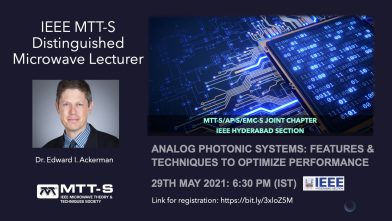
-
Saturday, May 29, 2021 9:00 am - 10:30 am(New York Time) Add to my calendar
Analog Photonic Systems: Features & Techniques to Optimize Performance
Dr. Edward I. Ackerman
Photonic Systems Inc, Billerica, MA, USA
IEEE MTT-S Distinguished Microwave Lecturer, Class 2019-2021
Abstract: Both the scientific and the defense communities wish to receive and process information occupying ever-wider portions of the electromagnetic spectrum. This can often create an analog-to-digital conversion “bottleneck”. Analog photonic channelization, linearization, and frequency conversion systems can be designed to alleviate this bottleneck. Moreover, the low loss and dispersion of optical fiber and integrated optical waveguides enable most of the components in a broadband sensing or communication system, including all of the analog-to-digital and digital processing hardware, to be situated many feet or even miles from the antennas or other sensors with almost no performance penalty. The anticipated presentation will highlight the advantages and other features of analog photonic systems (including some specific systems that the author has constructed and tested for the US Department of Defense), and will review and explain multiple techniques for optimizing their performance.
Speaker’s Bio: Edward I. Ackerman received his B.S. degree in electrical engineering from Lafayette College in 1987 and his Ph.D. in electrical engineering from Drexel University in 1994. From 1989 through 1994 he was employed as a microwave photonics engineer at GE’s Electronics Laboratory in Syracuse, New York. From 1995 to July 1999 he was a member of the Technical Staff at MIT Lincoln Laboratory. For both institutions he designed high-performance analog photonic links for microwave communications and antenna remoting applications. Since 1999 he has been Vice President of R & D for Photonic Systems, Inc. of Billerica, Massachusetts. Dr. Ackerman is a Fellow of the IEEE and MTT-S DML from class of 2019-2021
This Lecture is sponsored by IEEE MTT Society DML Program, organized by MTT-S/AP-S/EMC-S Joint Chapter, IEEE Hyderabad Section.
Registration is Free but it is Mandatory. Online link will be shared only to registered participants.